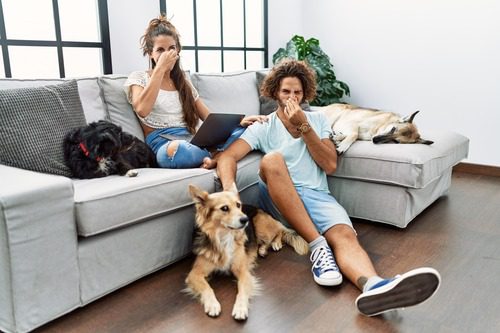When a dog has an odor that doesn’t go away after a bath—or comes back just a day or two later—it can be frustrating for everyone in the home. Dogs may carry a slight scent from natural oils or time spent outdoors, but if that smell becomes overpowering or unusual, something more may be going on. You might find yourself constantly wondering, why does my dog smell? Odor can be a sign of several underlying issues, from skin infections to dental problems. If your dog’s smell seems unusual or persistent, it’s time to take a closer look. Here’s what might be causing that odor—and why a visit to Acton Animal Hospital in Acton, MA is a smart next step. Please call us at 978-263-7477 to schedule your dog’s exam.

Common Reasons Why Dogs Smell Bad
When pet owners ask, why does my dog smell?, the answer usually comes down to one of a few common health concerns. While some dogs naturally have a stronger scent than others due to their breed or skin type, excessive odor usually has an identifiable cause. Let’s explore the most frequent reasons dogs develop strong or unpleasant odors and how these problems are typically identified in a veterinary setting.
Skin Infections and Allergies
One of the leading causes of odor in dogs is a skin infection, often linked to allergies or excessive moisture. Bacterial and yeast infections can take hold in warm, damp areas such as skin folds, armpits, and paws. These infections often create a sour, musty, or even corn chip-like smell. Dogs with underlying allergies are more prone to skin irritation and overgrowth of yeast or bacteria. In some cases, you may also see redness, flaking, or oily patches on the skin. Dogs might lick or scratch more than usual, which can make the issue worse. Routine bathing alone can’t resolve infections—these require your veterinarian’s diagnosis and appropriate treatment.
Dental Disease and Bad Breath
Oral health problems can cause persistent bad breath that lingers even when your dog hasn’t eaten anything unusual. Gum disease, tooth decay, and tartar buildup can all contribute to an unpleasant smell. In advanced cases, dental infections may lead to draining abscesses, which release a strong odor from the mouth or jaw. If your dog’s breath smells unusually foul or you notice signs like drooling, difficulty chewing, or visible tartar on the teeth, it’s time to schedule a dental evaluation. Regular veterinary cleanings play a major role in reducing the risk of these issues. Pet owners who ask, why does my dog smell, often discover that dental care is a missing piece of the puzzle.
Ear Infections
Dogs with frequent ear infections may develop a persistent head or ear odor that doesn’t go away. This is especially common in dogs with floppy ears or heavy hair growth in the ear canal. The warm, dark, and moist environment inside the ear can easily become a breeding ground for yeast and bacteria. Infected ears often emit a strong, sour, or sweet smell. You may also notice discharge, redness, or excessive head shaking. If your dog’s head smells unpleasant, especially around the ears, an infection could be the cause. A veterinary exam is necessary to diagnose the type of infection and determine the appropriate care plan.
Why Does My Dog Smell Like Fish?
If you’ve ever caught a whiff of a strong, fishy odor coming from your dog, the culprit might be the anal glands. These small sacs located near the rectum release a distinctive scent when your dog defecates. In some dogs, the glands don’t empty properly and may become impacted or infected, causing a powerful and unpleasant odor.
This fishy smell can linger on your dog’s fur or bedding and may even occur spontaneously if the glands leak. In cases like these, pet owners are often surprised by how intense the odor becomes. If you’re asking, why does my dog smell like fish, it’s best to have your veterinarian examine the anal glands to determine if they need to be manually expressed or if further treatment is necessary.
How Your Dog’s Coat and Grooming Habits Affect Odor
Some dogs are simply more prone to retaining odor due to the nature of their coat. Breeds with thick, water-resistant fur—such as retrievers or spaniels—may trap moisture and debris more easily. Without regular grooming, this buildup can lead to odor. Double-coated and long-haired breeds often require more frequent brushing and professional grooming to prevent matting, which can trap bacteria and cause skin irritation. If you’ve been wondering, why does my dog smell even though I give them baths, grooming may be the missing link. A professional groomer can help manage shedding, clean hard-to-reach areas, and keep the skin healthy between vet visits.
Wet Dog Smell
Every dog owner is familiar with that classic “wet dog” smell—but if your dog still smells days after a bath, something else may be going on. The odor comes from microorganisms on the skin and fur, which release scent molecules when exposed to water. In healthy dogs, this scent typically fades as the coat dries. But in dogs with skin infections, allergies, or poor coat condition, the smell can linger. Bathing too often with the wrong products can also strip the skin of protective oils, making odors worse over time. If this scenario sounds familiar, a veterinary evaluation can help you pinpoint what’s causing the persistent scent.
Could Diet or Digestion Be a Factor?
Digestive health plays a role in how your dog smells—especially when it comes to flatulence or body odor. Dogs with food intolerances or sensitivities may experience excessive gas, bloating, or poor stool quality. These issues can lead to a stronger natural scent or frequent digestive discomfort. If you’re asking yourself why does my dog smell worse after meals, your veterinarian might recommend evaluating your dog’s diet. While food isn’t always the direct cause of body odor, it can influence your dog’s gut health, which in turn may affect odor in more subtle ways. Keep track of what your dog eats and report any digestive concerns during their next appointment.
When Should You Call Your Vet About Your Dog’s Smell?
If your dog has an odor that doesn’t improve with regular grooming—or if the smell keeps returning—it’s time to schedule a veterinary exam. Persistent odor can be a sign of infection, dental disease, or other underlying issues that require professional attention. While the question may seem simple, the cause is often more complex.
At Acton Animal Hospital, our team will examine your dog thoroughly to identify what’s behind the smell and recommend the best next steps. Early intervention can prevent more serious complications and help your dog feel more comfortable. We welcome pet owners in Acton, MA and the surrounding communities to call us at 978-263-7477 and book an appointment.
Recent Posts
About Us
Our veterinarians in Acton, MA bring over 80 years of combined experience and a multitude of services for your pet.
